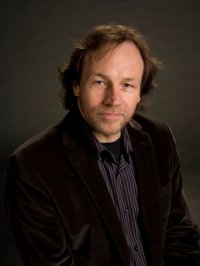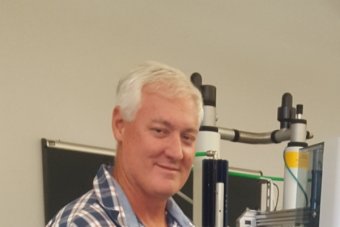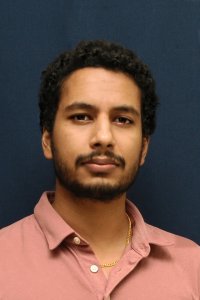By David Simpson
Hans-Peter Plag
In Puerto Rico, natural and human forces are straining the freshwater ecosystem. Certainly, this is a vital concern for the land of more than 3 million people. Yet topography, climate, politics and competing stakeholders have stymied efforts to find solutions.
This summer seven ODU students confronted the issue during a class that led them to the U.S. territory for a 10-day service learning trip. The goal was ambitious: produce a case study analyzing the complex problem and recommend actions to the U.S. Fish and Wildlife Service (FWS).
Sustainability Leadership, a transdisciplinary course, was taught by Professor Hans-Peter Plag of ODU's Ocean, Earth & Atmospheric Sciences Department (OEAS); Associate Professor Eddie Hill of the Park, Recreation & Tourism Studies program; and Senior Lecturer Tatyana Lobova of Biological Sciences.
Helping to make the course possible was a $1,000 grant awarded to Plag by the Office of the Provost. The grant was one of four bestowed this past spring as part of the Course-based Undergraduate Research (CURE) program, which aims to generate active learning in the classroom by embedding the research process into course curricula. The Provost's Office made available grants of $1,000 or $2,000; this money was supplemented with departmental funding and funding from the Dean's Office in the College of Sciences. The four recipients are faculty in that college.
Plag said his CURE project "provided students the opportunity to learn by research experience in a real-world setting, which has a life-changing impact on most students."
The class, OEAS/BIOL/IDS 467 (in parallel to BIOL/OEAS 567), began meeting at ODU on May 20. Students learned, among other things, to use a case-study template developed by the University's Mitigation and Adaptation Research Institute (MARI). The research tool helps students address complex, seemingly unsolvable problems using a systems thinking approach and a stock-and-flow model, said co-instructor Hill.
On June 7 the group left for Puerto Rico, where students conducted field work, met with stakeholders and worked on the case study.
Students focused on the Rio Grande de Arecibo watershed. There, two reservoir dams - one used for agricultural water needs, one for hydroelectric power - segment the river and severely tax the freshwater ecosystem, according to the course description. Rising seas and temperatures along with extreme fluctuations in rainfall worsen the problem.
In the case study, students addressed how to meet the water needs of the people while safeguarding freshwater ecosystems. The report recommended 20 actions related to infrastructure improvements, participatory governance for sustainable policy-making, reduction of waste and pollution, and freshwater storage.
The class finished its work back at ODU.
Hill called the course experience "transformational" and said one of the many aspects that made it so was teaching students to use the MARI template.
"The CURE funds allowed us to support a student and two faculty to further develop this tool," he said.
During the grant period they will also adapt the template for high school students through a partnership with Paradise Creek Nature Park in Portsmouth, said Hill.
The ODU students' report is now in the hands of the Fish and Wildlife Service, which will consider their recommendations as it weighs options for progress in Puerto Rico.
John Cooper and Kory Castro
Each grant recipient was expected to develop and offer a CURE class as a pilot course in summer or fall of 2019. Successful applicants were notified at the end of April, and money was to have been spent by June 15.
Before the fall semester began, the other grant winners reported on their experiences for this article. Their accounts follow:
John Cooper, professor and chair: Chemistry and Biochemistry
Grant title: "Implementation of an Undergraduate Research Component into Methods of Instrumental Analysis Course Modules Designed for High Instructor to Student Course Ratios"
"The CURE grant funding was used to update CHEM 422 Instrumental Analysis Laboratory. The course is an upper-level lab that focuses on the theory, proper use, and limitations of advanced instrumentation. To incorporate research into the course, the lab experiments were redesigned to utilize modern techniques using real-world applications.
"For example, gas chromatography-mass spectrometry (GC-MS) is an analytical technique that is widely used in industry and academia. We have the instrument in the department and the necessary sampling accessories were purchased using CURE funds to perform pesticide analysis by EPA method 525. The method uses solid-phase extraction (SPE) to extract pesticides from environmental water samples. By including this as a lab, the students have the opportunity to quantitate residual pesticides in local waters as well as learn the fundamentals of the instrumentation. This new lab was validated this summer by having an undergraduate student carry out the testing on local waters of his choice. The funding for the student and the instructor who adapted the EPA method for ODU were funded as part of the CURE proposal.
"The two other research inclusions that were developed are:
"Determination of active drug decomposition in commercial Tylenol due to age and/or heat using Liquid chromatography mass spectrometry (e.g., comparing new tablets to tablets that have been sitting in their medicine cabinets for years or tablets that were left in their car over the semester ...).
"Quantification of elements important for plant growth in local soils using X-ray fluorescence and atomic absorbance spectrometry.
"In addition to allowing students to draw conclusions about local environments that are important to them, the experiments demonstrate lab concepts that are important to developing proper quantitative methods, such as field blanks, internal standards, and reproducibility studies. After learning the fundamentals of the instrumentation, quantitative methodology, and modern techniques the students will then also develop an instrumental method to address a novel problem in their area of interest.
"The method development for the labs was carried out by a new faculty member in Chemistry, Kory Castro, and the validation was carried out by the son of Ken Saal (ODU IT), rising sophomore Ryan. Based on the success of a rising sophomore being able to understand and carry out these mini research modules, we are now evaluating the possibility of having each module listed as an individual short course to open up the experience to non-chemistry majors who seek this type of experience."
Rohan Maddamsetti
Rohan Maddamsetti, visiting assistant professor, Biological Sciences
Grant title: "Active Learning of Bioinformatic Algorithms Through Coding and Research"
"I have designed a year-long course [BIOL451/551 Bioinformatics and Genomics I] that will give students the skills to participate in the computational revolution in biology. The first semester of this course will give students hands-on experience in writing simple yet powerful computer programs in the Python programming language and making beautiful data visualizations in the R programming language. I will also teach students how to combine existing pieces of bioinformatics software to develop workflows for computational experiments. The second semester of this course will build on the knowledge of writing programs that students acquired during the first semester. We will learn about some key techniques "under the hood" of software that has been critical to the genomics revolution. Topics will include: graph algorithms, evolutionary trees, probability models for DNA and protein sequences, and an introduction to deep learning in biology.
"A large percentage of the grade for this class will be based on students' participation in solving the coding challenges presented to them as in-class work and homework. Solutions will be discussed in class alongside short lectures teaching new material. The rest of their grade will be based on progress made during a year-long student-designed research project, pursued either individually or in small groups of 2-3 students. The first semester of the course will include a journal club in which students will present papers relevant to the project that they have in mind. The first midterm will be a short research project proposal in which students present the question they would like to study, using publicly available genomic datasets. The first-semester final will be a report of preliminary findings in the course of their research. The midterm for the second semester will be a progress report of current research findings over the year. The final for the second semester will be a full scientific report, presenting the research question, methods used to answer the question, and the outcome of those computational experiments. Exceptional work will be submitted for publication, or for presentation at a conference, with students as lead authors. This course will teach technical fundamentals, while giving students the opportunity to put those fundamentals into practice through a year-long research project."
Robert Strozak, master lecturer, Mathematics, chief departmental advisor
Grant title: "Entrepreneurship in Mathematics"
"I wanted the CURE money for travel expenses. In March 2020 I and the students will travel to the International Conference on Teaching in Collegiate Mathematics (ICTCM) where we will present their projects before educational professionals. The class [MATH 494: Entrepreneurship in Mathematics] has four students, and I was hoping to subsidize most of their travel expenses. Through the CURE grant I've been able to secure a matching financial commitment from the Math Department AND the College of Sciences. I think that would have been impossible without CURE.
"As for details of the course, it will be designed for those whose goal is to become a teacher, instructional designer, or professional trainer. We will discuss various presentation, interaction, and assessment technologies so that the students can create a complete 'package' for a particular mathematical topic."
The CURE grants were awarded after vetting in a competitive process overseen by Annette Finley-Croswhite, director of the Center for Faculty Development. The CURE committee also included: Craig Bayse, interim associate dean, College of Sciences; Scott B. Harrison, associate VP for administration (SCL); David Gauthier, associate professor, Biological Sciences; and Thomas Chapman, associate professor, Political Science and Geography.






